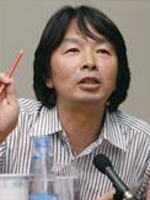|
 |
 |
|
Liu Xinglong (LI FANGYU) |
Liu Zhenyun (LI FANGYU) |
The prizes were awarded for the works and not because of the authors who wrote them, said Gao. But the results show most of the nominees were realistic novels by well-known writers who were older than 50 and who established their names in the late 1980s, which became increasingly obvious after four rounds of voting. Bi, born in 1964, is the only exception.
"It's easy to make the selection open and transparent, but it's hard to have absolutely fair results that satisfy everyone," said Mo Yan at a press conference arranged for the readers to meet the laureates on August 26.
"We are encouraged as the prize has diverted a great deal of attention to literature in a world where literary writing and reading are increasingly marginalized," Mo said.
One significance of the prize is the fact it provides modern Chinese models for serious reading and proof of a particular phase of the Chinese civilization for future research, Gao said.
For the first time, the prize opened its door to popular novels published online, but all seven nominated online novels failed in the first two rounds of voting.
Hu attributed the failure to the small number of online novel nominees and the fact most online novels targeted the popular market while the Mao Dun Literature Prize is an award targeting "pure" literature.
Still, not all online novels should be labeled as popular reading, and the CWA is considering a prize for pop literature to encourage more people to write in the future, Hu said.
"The elements of literature remain the same despite the changes in instruments. While writing online, authors should also be able to tell good stories and create vivid characters, which is the simple and uncompromising rule of literary writing, " said Gao.
Realistic themes
The five novels share a realist perspective, which Liu Zhenyun interpreted as "a realistic attitude toward life," "a state of always being conscious of what occurs" and "the ability to rein the imagination to explore every corner and detail of reality."
The 39-volume novel Endless Wanderings, which topped the five winners with 58 votes, tells the stories of a group of people born in the 1950s whose families bear witness to the country's political and social transformation. The novel, loosely divided in 10 units, took Zhang 22 years to finish. The 4.5-million-word novel in length equates to six copies of the four-volume A Dream of Red Mansions, the Chinese classic masterpiece by Cao Xueqin (1715-1763).
"Endless Wanderings was awarded the prize not only because of its artistic achievements, but also because of the author's faith in pursuing his literary dreams, and his perseverance in writing," said literary critic Su Ning, who is the Director of the Literature Institute of Sichuan Academy of Social Sciences.
While Endless Wanderings is considered a landmark work in Chinese contemporary literature, other novels such as Heavenly Mission, which depicts low-income teachers in poverty-stricken rural areas who manage to perform their roles without government subsidy, and Frog, which reflects on China's birth control practices through the eyes of a rural gynecologist, described the pain and emotional struggle the Chinese people have gone through as its growth engine roared on, literary critic Li Guoping said.
Liu Xinglong, the author of Heavenly Mission said it was a sorrowful story, "The story had hovered over my head for a long time before I began writing it down. It is not only the pain of my own heart; it is also the pain of the country."
Frog depicts the life of a rural gynecologist, a character based on the author's aunt, who struggles with an emotional breakdown after a 30-year career of performing forced abortions and sterilizations.
A Sentence Is Worth Thousands is a simple story, describing a man's constant search for someone to talk to, mirroring people's loneliness in a society without religion. Meanwhile, Massage concentrates on the world of a group of blind people, exploring their inner world. "This is an area rarely touched upon by other authors," said Lei Da, a member of the judging panel.
"Heavenly Mission, Frog and Massage show not only writers' consciousness of the humanities but also their sense of being different and creative. They have added to old topics new thoughts," said writer and CWA member Liang Hongying.
To a global audience
China is one of the largest publishers in the world but Chinese writers receive little recognition in literary circles outside of China. Winners of the Mao Dun Literature Prize said more Chinese novels have to be translated into foreign languages to reach an international audience.
"Chinese readers know more about Western writers and their works than Westerners do about Chinese literature. It is very common to see Chinese versions of Western literary classics and best sellers on bookshelves of Chinese households. But this is not the case with Chinese books in homes in the West," said Liu Xinglong.
"It's not because of the quality of works of Chinese writers," Liu Zhenyun said. "One of the most important reasons is the lack of Chinese works translated into other languages."
It's easy to identify the influence from eminent Western novelists on Chinese writers' style. For instance, Mo and Zhang all acknowledged the influences on their writings from U.S. novelist William Faulkner and Colombian writer Gabriel García Márquez, author of One Hundred Years of Solitude.
Of this year's five winners, Mo, born in 1955, is the oldest and most familiar to Western readers. His work Red Sorghum, which was made into a film by famous Chinese director Zhang Yimou, was popular in the West. He has his five-piece Red Sorghum series translated and published into 12 languages; Big Breasts & Wide Hips into 11 languages; and Sandalwood Penalty in five languages. In addition, many countries have published his short stories and collections of essays.
"Overseas readers are most accustomed to the older novels about the "cultural revolution" (1966-76) and the countryside, from writers like Mo Yan or Su Tong. There's also a certain familiarity with novels written by young women about sex, drugs and rock and roll in China," Eric Abrahamsen, a literary translator in Beijing who reads Chinese writers regularly, told Beijing Review.
But Abrahamsen, who translated a novel of Wang Xiaofang, Notes of a Civil Servant, for Penguin and many short pieces, said readers had largely lost interest in these genres, without really knowing what else they wanted to read.
"A good understanding of the Chinese literary scene on the part of foreign publishers is probably the single most important thing. Once editors have a good grasp of what's out there, they'll be able to pick books they're relatively confident readers will be interested in and, most importantly, they'll be willing to put resources into promoting those books, so that people actually end up reading them," he said.
"There is still a long way to go—so much good Chinese literature still hasn't been translated—but more is coming out, slowly but steadily," he said. | 